(完整版)一般将来时基本用法
完整版一般将来时时态用法讲解

般将来时时态1. 一般将来时的定义一般将来时表示在现在看来即将要发生的动作或存在的状态。
常用时间副词tomorrow, soon 或短语n ext year / week / mon th, in a few days, in the future, sometime 做状语。
如:What will you do this afternoon ? 你今天下午干什么?We will have a meet ing tomorrow. 我们明天要开会。
He is going to study abroad (到国外) next year.明年他要出国学习。
2. 一般将来时的结构及应用(1) shall / will + 动词原形。
表示即将发生的动作或存在的状态。
特别是表示客观性的事情或在某条件下要发生的事情,只能用此结构。
如:What shall we do if he doesn '如果他不?来,我们该怎么办?Will you be free this evenin g? 今天晚上有空吗?I think he will tell us the truth (真相)。
我想他会告诉我们真实情况的。
(2) be going to +动词原形。
表示已经计划或安排好了的事情,也可表示有迹象表明肯定要发生的事情。
如:We are going to have a meeting to discuss (讨论)the matter this evening. 今天晚上开会讨论这件事情。
Look at the black clouds over there. I think it is going to rain soon. 看一看那边的乌云,我想天要下雨了。
There is going to be an En glish evening this week. 本周要举行一个英语晚会。
(3) be +现在分词。
一般将来时态用法

一般将来时态用法一般将来时表示在将来某个时间要发生的动作或存在的状态。
一. 一般将来时的基本用法:表示“纯粹的将来”:①表示将要发生的动作或情况,常带有表示将来的时间状语,如tomorrow, next week, in two days, from now on 等。
如:It will be fine tomorrow. 明天天气晴朗。
②表示预料将要发生的动作或情况。
如:You will feel better after having this medicine. 吃了这药,你就会感觉好些的。
二. 一般将来时的构成:1. 由助动词“ shall/ will +动词原形”构成,shall 用于第一人称,will 用于第二、第三人称,而美式英语在陈述句中无论什么人称,一律用will. 表示“带有情态意义的将来”,用来表示意图,用will 来表示。
如:I will be more careful next time. 下次我要更加小心。
I won't go shopping this afternoon, but she will. 今天下午我不想去购物,但她想去。
2. will 在疑问句中,用来表示有礼貌地征询对方的意见。
如:Will you have some more tea 要不要再喝点茶What shall we do this weekend 本周末我们要干什么3. 一般将来时的否定和疑问形式:一般将来时的否定形式是will not ,缩写为won't; shall not ,缩写为shan't 。
一般将来时的疑问形式是把will/ shall 提到主语前。
如:He won’t go to th e park this Sunday. 本周日他不去公园。
Will you go swimming with me 和我一起去游泳好吗4. shall只用于第一人称,如用于第二、第三人称,就失去助动词的意义,已变为情态动词,试比较: He shall come. 他必须来。
完整版)一般将来时基本用法
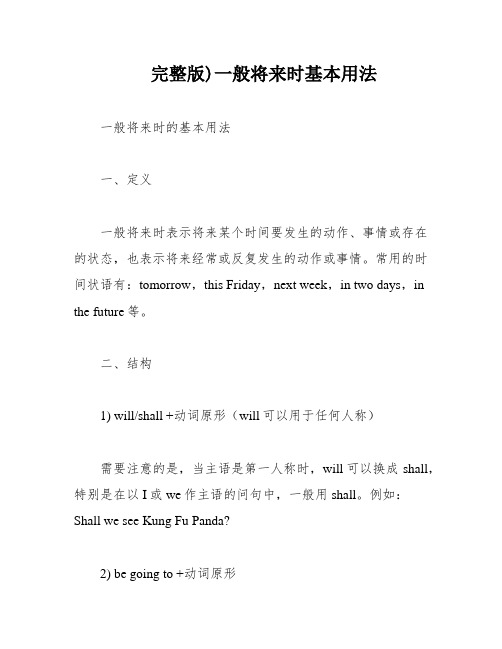
完整版)一般将来时基本用法一般将来时的基本用法一、定义一般将来时表示将来某个时间要发生的动作、事情或存在的状态,也表示将来经常或反复发生的动作或事情。
常用的时间状语有:tomorrow,this Friday,next week,in two days,in the future等。
二、结构1) will/shall +动词原形(will可以用于任何人称)需要注意的是,当主语是第一人称时,will可以换成shall,特别是在以I或we作主语的问句中,一般用shall。
例如:Shall we see Kung Fu Panda?2) be going to +动词原形例如:I’m going to play the piano。
be going to和will的区别be going to和will的用法虽然都表示将来发生动作或情况,一般情况下能互换。
但它们的用法是有区别的。
be going to主要用于:1、表示事先经过考虑、安排好打算、计划要做的事情。
例如:Dad and I are going to watch an opera this afternoon.2、表示根据目前某种迹象判断,某事非常有可能发生。
例如:Look。
There come the dark clouds。
It is going to rain.三、一般疑问句和否定句一般疑问句:1) will/shall +动词原形(will可以用于任何人称)——在will后加not2) be going to +动词原形——在be后加not例如:She will come back in three days.Will she not come back in three days?They are going to clean their classroom.Are they not going to clean their classroom?否定句:1) will/shall +动词原形(will可以用于任何人称)——将will提前2) be going to +动词原形——将be提前例如:She will come back in three days.She will not come back in three days.Will she come back in three days?XXX is whether they will actually do it。
(完整版)一般将来时
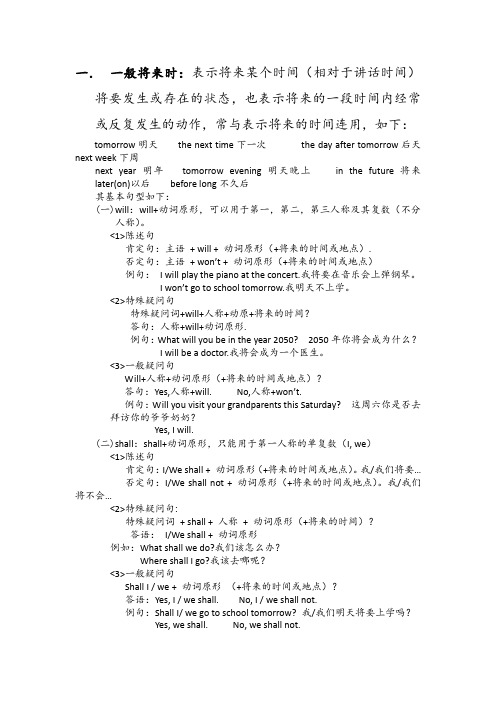
一.一般将来时:表示将来某个时间(相对于讲话时间)将要发生或存在的状态,也表示将来的一段时间内经常或反复发生的动作,常与表示将来的时间连用,如下:tomorrow明天the next time下一次the day after tomorrow后天next week下周next year明年tomorrow evening明天晚上in the future将来later(on)以后before long不久后其基本句型如下:(一)will:will+动词原形,可以用于第一,第二,第三人称及其复数(不分人称)。
<1>陈述句肯定句:主语+ will + 动词原形(+将来的时间或地点).否定句:主语+ won’t + 动词原形(+将来的时间或地点)例句:I will play the piano at the concert.我将要在音乐会上弹钢琴。
I won’t go to school tomorrow.我明天不上学。
<2>特殊疑问句特殊疑问词+will+人称+动原+将来的时间?答句:人称+will+动词原形.例句:What will you be in the year 2050? 2050年你将会成为什么?I will be a doctor.我将会成为一个医生。
<3>一般疑问句Will+人称+动词原形(+将来的时间或地点)?答句:Yes,人称+will. No,人称+won’t.例句:Will you visit your grandparents this Saturday? 这周六你是否去拜访你的爷爷奶奶?Yes, I will.(二)shall:shall+动词原形,只能用于第一人称的单复数(I, we)<1>陈述句肯定句:I/We shall + 动词原形(+将来的时间或地点)。
我/我们将要…否定句:I/We shall not + 动词原形(+将来的时间或地点)。
动词时态一般将来时的用法

动词时态一般将来时的用法动词时态包含了多种不同的形式,每种形式都传达了特定的时间信息。
在英语中,一般将来时是用来表达将来发生的动作、事件或状态的。
本文将详细介绍一般将来时的用法,并提供一些例句来帮助读者更好地理解。
一、一般将来时的定义一般将来时是用来表达明确的将来发生的动作或状态。
通常使用的助动词是will或shall,根据主语的不同而定。
二、一般将来时的构成1. 肯定句结构:主语 + will + 动词原形例如:- I will go shopping tomorrow.- He will travel to Europe next week.2. 否定句结构:主语 + will + not + 动词原形,或主语 + won't + 动词原形例如:- She will not visit her grandparents this weekend.- They won't attend the party.3. 疑问句结构:Will + 主语 + 动词原形?例如:- Will you join us for dinner?- Will they arrive on time?三、一般将来时的用法1. 表达自愿或意愿一般将来时常常用来表达主观上的决定、打算或愿望。
例如:- I will help you with your project.- He will volunteer at the local charity organization.2. 表示未来的计划或安排一般将来时可用于描述预定的时间表或安排。
例如:- We will have a meeting at 9am tomorrow.- They will arrive at the airport in the evening.3. 表示预测或推测有时,我们可以根据现有的证据或情况,使用一般将来时来推测未来可能发生的事情。
一般将来时的基本结构和用法
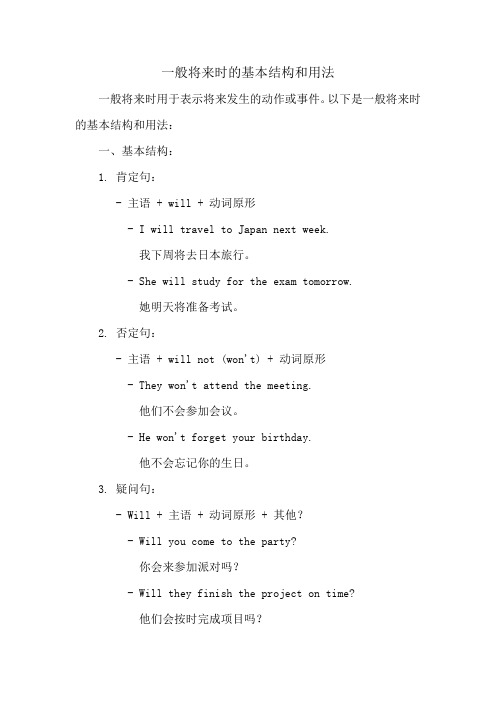
一般将来时的基本结构和用法
一般将来时用于表示将来发生的动作或事件。
以下是一般将来时的基本结构和用法:
一、基本结构:
1. 肯定句:
- 主语 + will + 动词原形
- I will travel to Japan next week.
我下周将去日本旅行。
- She will study for the exam tomorrow.
她明天将准备考试。
2. 否定句:
- 主语 + will not (won't) + 动词原形
- They won't attend the meeting.
他们不会参加会议。
- He won't forget your birthday.
他不会忘记你的生日。
3. 疑问句:
- Will + 主语 + 动词原形 + 其他?
- Will you come to the party?
你会来参加派对吗?
- Will they finish the project on time?
他们会按时完成项目吗?
二、用法:
- 表示将来发生的动作或事件。
- 表示预测、承诺、意图、计划等将来的行为或状态。
- 通常与表示将来时间的时间状语连用,如 tomorrow, next week, in the future 等。
值得注意的是,一般将来时通常用于与将来相关的动作和事件,而对于已经计划或安排好的未来事件,可以使用 "be going to" 结构。
一般将来时态的基本用法-运用方法-有哪些用法
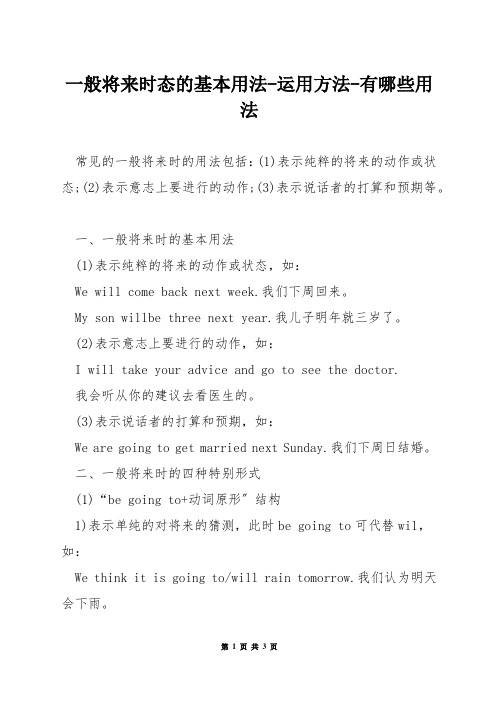
一般将来时态的基本用法-运用方法-有哪些用法常见的一般将来时的用法包括:(1)表示纯粹的将来的动作或状态;(2)表示意志上要进行的动作;(3)表示说话者的打算和预期等。
一、一般将来时的基本用法(1)表示纯粹的将来的动作或状态,如:We will come back next week.我们下周回来。
My son willbe three next year.我儿子明年就三岁了。
(2)表示意志上要进行的动作,如:I will take your advice and go to see the doctor.我会听从你的建议去看医生的。
(3)表示说话者的打算和预期,如:We are going to get married next Sunday.我们下周日结婚。
二、一般将来时的四种特别形式(1)“be going to+动词原形〞结构1)表示单纯的对将来的猜测,此时be going to可代替wil,如:We think it is going to/will rain tomorrow.我们认为明天会下雨。
2)表示说话者对将来有依据的猜测,如:Look at those black clouds!It's going to rain.看那些乌云!要下雨了。
3)表示说话者深思熟虑后的打算,如:He is going to be a teacher when he grows up.他长大后要当老师。
(2)“be to+动词原形〞结构,表示按计划将要进行的动作或征求对方看法,如:My son is to go to school tomorrow.我儿子明天要去上学。
Are we to discuss about this project?我们要讨论这个项目吗?(3)“be about to+动词原形〞结构,表示马上发生的动作,如: We are about to leave.我们正要离开。
(完整版)小学一般将来时用法小结
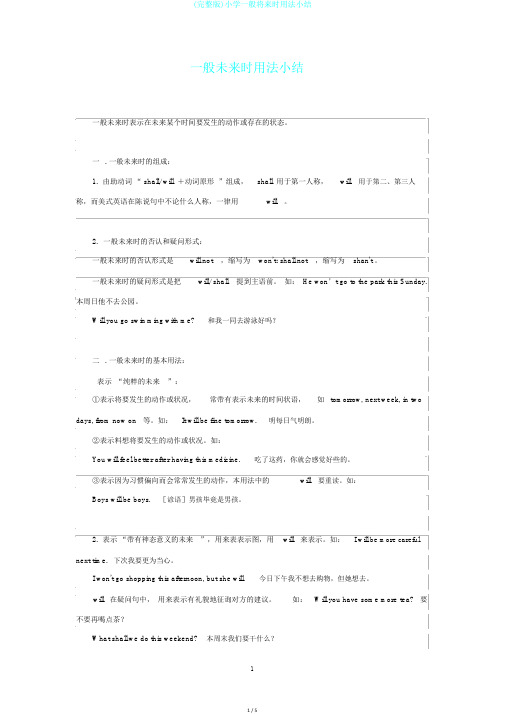
一般未来时用法小结一般未来时表示在未来某个时间要发生的动作或存在的状态。
一. 一般未来时的组成:1. 由助动词“ shall/ will +动词原形”组成,shall 用于第一人称,will用于第二、第三人称,而美式英语在陈说句中不论什么人称,一律用will。
2.一般未来时的否认和疑问形式:一般未来时的否认形式是will not,缩写为won't; shall not,缩写为shan't 。
一般未来时的疑问形式是把will/ shall提到主语前。
如:He won’t go to the park this Sunday. 本周日他不去公园。
Will you go swimming with me?和我一同去游泳好吗?二. 一般未来时的基本用法:表示“纯粹的未来”:①表示将要发生的动作或状况,常带有表示未来的时间状语,如tomorrow, next week, in two days, from now on等。
如:It will be fine tomorrow.明每日气明朗。
②表示料想将要发生的动作或状况。
如:You will feel better after having this medicine.吃了这药,你就会感觉好些的。
③表示因为习惯偏向而会常常发生的动作,本用法中的will要重读。
如:Boys will be boys.[谚语]男孩毕竟是男孩。
2. 表示“带有神态意义的未来”,用来表表示图,用will来表示。
如:I will be more careful next time.下次我要更为当心。
I won't go shopping this afternoon, but she will.今日下午我不想去购物,但她想去。
will在疑问句中,用来表示有礼貌地征询对方的建议。
如:Will you have some more tea?要不要再喝点茶?What shall we do this weekend?本周末我们要干什么?三. 一般未来时的其余几种表示法:1. 用 be going to表示:be going to相当于一个助动词,与后来的动词原形一同组成句子的谓语,表示近期将要发生的动作或存在的状态。
- 1、下载文档前请自行甄别文档内容的完整性,平台不提供额外的编辑、内容补充、找答案等附加服务。
- 2、"仅部分预览"的文档,不可在线预览部分如存在完整性等问题,可反馈申请退款(可完整预览的文档不适用该条件!)。
- 3、如文档侵犯您的权益,请联系客服反馈,我们会尽快为您处理(人工客服工作时间:9:00-18:30)。
一般将来时基本用法一、定义一般将来时表示将来某个时间要发生的动作,事情或存在的状态,也表示将来经常或反复发生的动作或事情。
(与将来时连用的时间状语:tomorrow,this Fri day,next week,in two days,in the future等)二、结构1)will/shall + 动词原形(will可以用于任何人称)需要注意的是当主语是第一人称时will可以换成shall,特别是在以I或we作主语的问句中,一般用shall。
例:Shall we see Kung Fu Panda?2)be going to +动词原形例:I’m going to play the piano.be going to和will 的区别(了解)be going to和will 的用法虽然都表示将来发生动作或情况,一般情况下能互换。
但它们的用法是有区别的。
be going to主要用于:1、表示事先经过考虑、安排好打算、计划要做的事情。
例:Dad and I are going to watch an opera this afternoon.2、表示根据目前某种迹象判断,某事非常有可能发生。
例:Look! There come the dark clouds. It is going to rain.三、一般疑问句+否定句一般疑问句:1)will/shall + 动词原形(will可以用于任何人称)——在will后加not2)be going to +动词原形——在be后加not例:She will come back in three days.——She will not come back in three days.They are going to clean their classroom.——They are not going to clean their classroom.否定句:1)will/shall + 动词原形(will可以用于任何人称)——will提前2)be going to +动词原形——be提前例:She will come back in three days.——Will she come back in three days?They are going to clean their classroom.——Are they going to clean their classroom?Ps:will not=won’t shall not=shan’twill可以缩写成‘ll。
I will=I’ll He will=He’ll She will=She’ll等(一)、单选1 _____you ____a doctor when you grow up?A Will; going to beB Are; going to beC Are; /D Will; be2 I don’t know if his uncle _____.I think he _____ if it doesn’t rain.A will come; comesB will come; will comeC comes; comesD comes; will come3 He will be back _____a few minutes.A withB forC onD in4 What time _____we meet at the gate tomorrow?A willB shallC doD are5 He will have a holiday as soon as he _____the work next week.A finishesB doesn’t finishC will finishD won’t finish6 There _____some showers this afternoon.A will beB will haveC is going to beD are going to have7 It ____my brother’s birthday tomorrow. She _____a party.A is going to be; will haveB will be; is havingC will be; is going to haveD will have; is going to be8 Li Ming is 10 years old now, next year he _____11.A isB is going to beC will beD will to be答案:1 B 2B 3 D 4 B 5A 6A 7 C 8 C(二)、填空1 -“I need some paper.”- “I ____(bring)some for you.”2____(be)you free tomorrow?3 They _________(not leave) until you come back.4 _____we_____(go) to the party together this afternoon?5 They want to know when the meeting _____start.6 I _____(go) with you if I have time.7 Hurry up! Or we ______(be) late.8What ____you _______(do) tomorrow afternoon?9 Jenny ____ _____ (do) an experiment the day after tomorrow.10 If she isn’t free tomorrow, she _______(not take) part in the party.答案: 1 will bring 2 Are 3 won’t leave4Shall go 5 will 6 will go7 will be 8 are going to do 9 will do 10 won’t take一般将来时练习:( ) 1. There __________ a meeting tomorrow afternoon.A. will be going toB. will going to beC. is going to beD. will go to be( ) 2. Charlie ________ here next month.A. isn’t workingB. doesn’t workingC. isn’t going to workingD. won’t work( ) 3. He ________ very busy this week, he ________ free next week.A. will be; isB. is; isC. will be; will beD. is; will be( ) 4. There ________ a dolphin show in the zoo tomorrow evening.A. wasB. is going to haveC. will haveD. is going to be( ) 5. –________ you ________ free tomorrow?– No. I ________ free the day after tomorrow.A. Are; going to; willB. Are; going to be; willC. Are; going to; will beD. Are; going to be; will be( ) 6. Mother ________ me a nice present on my next birthday.A. will givesB. will giveC. givesD. give( ) 7. – Shall I buy a cup of tea for you?–________. (不,不要。
)A. No, you won’t.B. No, you aren’t.C. No, please don’t.D. No, please.( ) 8. – Where is the morning paper?– I ________ if for you at once.A. getB. am gettingC. to getD. will get( ) 9. ________ a concert next Saturday?A. There will beB. Will there beC. There can beD. There are( ) 10. If they come, we ________ a meeting.A. haveB. will haveC. hadD. would have( ) 11. He ________ her a beautiful hat on her next birthday.A. givesB. gaveC. will givingD. is going to giving( ) 12. He ________ to us as soon as he gets there.A. writesB. has writtenC. will writeD. wrote( ) 13. He ________ in three days.A. coming backB. came backC. will come backD. is going to coming back( ) 14. If it ________ tomorrow, we’ll go roller-skating.A. isn’t rainB. won’t rainC. doesn’t rainD. doesn’t fine( ) 15. – Will his parents go to see the Terra Cotta Warriors tomorrow?– No, ________ (不去).A. they willn’t.B. they won’t.C. they aren’t.D. they don’t.( ) 16. Who ________ we ________ swimming with tomorrow afternoon?A. will; goB. do; goC. will; goingD. shall; go( ) 17. We ________ the work this way next time.A. doB. will doC. going to doD. will doing( ) 18. Tomorrow he ________ a kite in the open air first, and then ________ boating in the park.A. will fly; will goB. will fly; goesC. is going to fly; will goesD. flies; will go( ) 19. The day after tomorrow they ________ a volleyball match.A. will watchingB. watchesC. is watchingD. is going to watch( ) 20. There ________ a birthday party this Sunday.A. shall beB. will beC. shall going to beD. will going to be( ) 21. They ________ an English evening next Sunday.A. are havingB. are going to haveC. will havingD. is going to have( ) 22. ________ you ________ free next Sunday?A. Will; areB. Will; beC. Do; beD. Are; be( ) 23. He ________ there at ten tomorrow morning.A. willB. isC. will beD. be( ) 24. ________ your brother ________ a magazine from the library?A. Are; going to borrowB. Is; going to borrowC. Will; borrowsD. Are; going to borrows( ) 25. – Shall I come again tomorrow afternoon?–________ (好的).A. Yes, pleaseB. Yes, you will.C. No, please.D. No, you won’t.( ) 26. It ________ the year of the horse next year.A. is going to beB. is going toC. will beD. will is( ) 27. ________ open the window?A. Will you pleaseB. Please will youC. You pleaseD. Do you( ) 28. –Let’s go out to play football, shall we?– OK. I ________.A. will comingB. be going to comeC. comeD. am coming( ) 29. It ________ us a long time to learn English well.A. takesB. will takeC. spendsD. will spend( ) 30. The train ________ at 11.A. going to arriveB. will be arriveC. is going toD. is arriving答案1. C 2. D 3. D 4.D 5. D 6. B 7. C 8. D9. B 10. B 11. D 12. C 13. C 14. C 15. B 16. D17. B 18. A 19. D 20. B 21. B 22. B 23. C 24. B25. A 26. A 27. A 28. D 29. B 30. D1. I ______(leave)in a minute. I ______(finish)all my work before I ______ (leave).2. —How long _____ you _____(study)in our country?—I _____(plan)to be here for about one more year.—I _____(hope)to visit the other parts of your country.—What ______ you ______(do)after you ______(leave)here?—I ______(return)home and ______(get)a job.3. I ______(be)tired. I ______(go)to bed early tonight.4. Mary’s birthday is next Monday, her mother _____(give)her a present.5. It is very cold these days. It ______(snow)soon.6. —_____ you _____(be)here this Saturday?—No. I ______(visit)my teacher.7. —______ I ______(get)you a copy of today’s newspaper?—Thank you.8. I am afraid there ______(be)a meeting this afternoon. I can’t join you.9. Mike ______(believe, not)this until he ______(see)it with his own eyes.10. Most of us don’t think their team ______(win)1. am leaving ; will finish ; leave2. will ; study ; plan ; hope ; will ; do ; leave ; will return ; get3. am ; will4. will give5. will snow6. Will , be ; will visit7. Shall ; get8. will be 9. won’t believe ; sees 10. will win。
